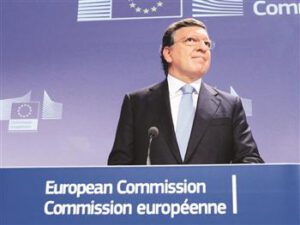The European Union has won theNobel Peace Prize for its efforts promote peace and democracy among its members and potential candidates, such as Turkey, which has long been negotiating for membership.
 “In the past decade, the possibility of EU membership for Turkey has also advanced democracy and human rights in that country,”Nobel Committee chairman Thorbjoern Jagland said when announcing the award in Oslo.
“In the past decade, the possibility of EU membership for Turkey has also advanced democracy and human rights in that country,”Nobel Committee chairman Thorbjoern Jagland said when announcing the award in Oslo.
The EU has transformed most ofEurope “from a continent of wars to a continent of peace,” he added.
The award served as a reminder that the EU had largely brought peace to a continent that had torn itself apart in two world wars in which tens of millions died.
“The admission of Croatia as a member next year, the opening of membership negotiations with Montenegro and the granting of candidate status to Serbia all strengthen the process of reconciliation in the Balkans,” he also said.
Jaglund praised the EU for rebuilding Europe after World War II and for its role in spreading stability after the fall of the Berlin Wall in 1989. “The European Union is currently undergoing grave economic difficulties and considerable social unrest. The Norwegian Nobel Committee wishes to focus on what it sees as the EU’s most important result: the successful struggle for peace and reconciliation and for democracy and human rights,” he said.
The debt crisis afflicting the single currency zone has brought economic instability to several member states, with rioting erupting on the streets of Athens and Madrid as austerity measures have bitten hard.
The prize, worth $1.2 million, will be presented in Oslo on Dec. 10. The decision by the five-member panel, led by Jagland who is also Secretary-General of the Council of Europe, was unanimous.
The EU won from a field of 231 candidates including Russian dissidents and religious leaders working for Muslim-Christian reconciliation. EU leaders immediately welcomed the award.
“The European Union has reunified a continent split by the Cold War around values of respect for human dignity, freedom, democracy, equality, the rule of law and respect for human rights,” said EU president Herman Van Rompuy and European Commission president Jose Manuel Barroso in a joint statement.
“I have to say that when I woke up this morning I did not expect it to be such a good day,” was the first response from a beaming Barroso. The win sent an important message to Europe “that the EU is something very precious,” he said. “We should cherish it.”
Hailing the choice of the crisis-hit EU, German Chancellor Angela Merkel said current efforts to save the euro were also about saving peace. “I often say that the euro is more than a currency … because at the end of the day it is about the original idea of a union of peace and of values.”
NATO, the military alliance set up by the United States after World War II, likewise saluted the award. “The European Union has played a vital role in healing the wounds of history and promoting peace, reconciliation and cooperation across Europe,” said NATOchief Anders Fogh Rasmussen.
Membership not on Norway’s agenda
Norway, the home of the peace prize, has voted “no” twice to joining the EU, in 1972 and 1994. The country has prospered outside the EU, partly thanks to huge oil and gas resources.
Norwegian Prime Minister Jens Stoltenberg congratulated the European Union on Oct. 11, but stressed his nation still had no plans to join the bloc. “This peace prize does not change the situation when it comes to Norway’s relationship to the EU,” he said, stressing that “membership is not on the agenda.”
Turkey ‘contributes’ to EU
Turkey’s perspective on its process for membership to the European Unioncontributed to the EU receiving the Nobel Peace Prize, Turkish EU Minister Egemen Bağış said.















